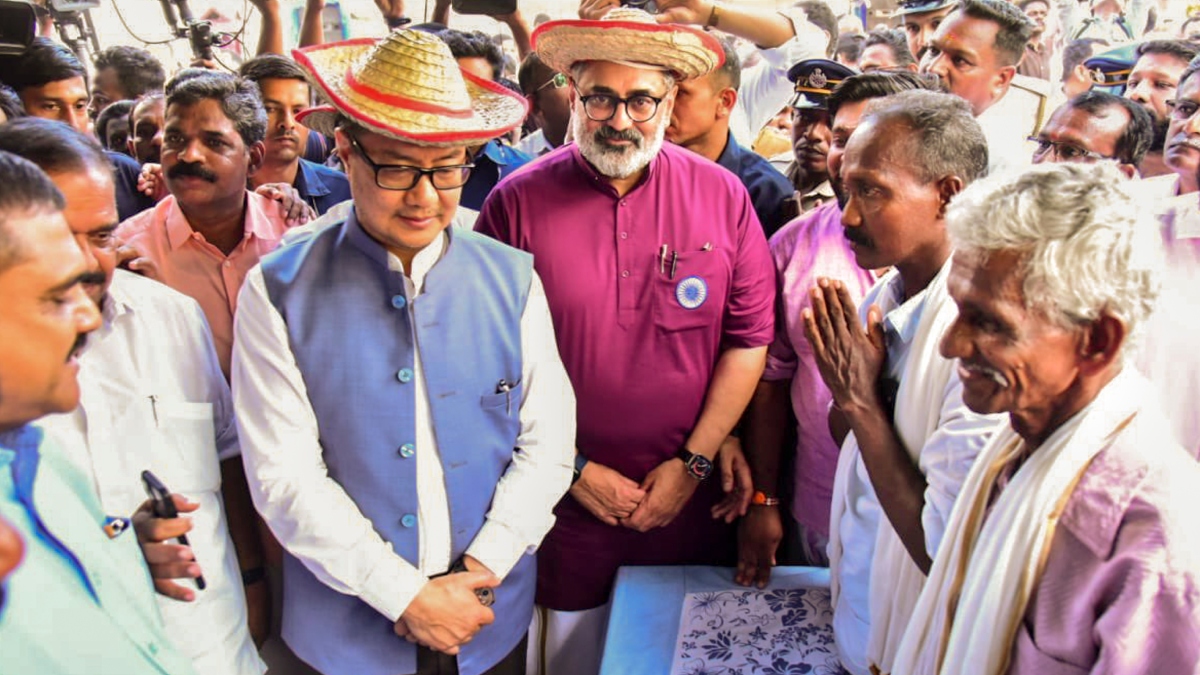Munambam row: BJP's another strategy backfires in Kerala after a promising beginning
 Union Minister Kiren Rijiju, Kerala BJP President Rajeev Chandrasekhar and other leaders meet members of Christian fishermen community, in Kerala's Munambam | PTI
Union Minister Kiren Rijiju, Kerala BJP President Rajeev Chandrasekhar and other leaders meet members of Christian fishermen community, in Kerala's Munambam | PTI
The BJP leadership in Kerala has long resembled a football team that storms onto the field with chest-thumping confidence—only to start scoring own goals the moment the match begins. The WAQF Amendment Act and the Munambam WAQF issue are no different—they follow the same script.
BJP had high hopes that the Act would act as bait—believing that both the LDF and UDF would be compelled to oppose it in Parliament—thereby helping the saffron party forge a new equation with Kerala’s Christian communities. It’s an open secret that the BJP’s state strategy hinges on wooing dominant Hindu groups alongside segments of the Christian population, particularly the Catholics. In fact, it was support from these quarters that helped the party clinch its first-ever Lok Sabha seat in Kerala—Thrissur.
ALSO READ | Munambam Waqf dispute: BJP admits no quick fix, says long legal battle ahead for residents
The BJP had promised to resolve the plight of over 600 families—mostly Christians—in Munambam, who have been living in uncertainty ever since the State WAQF Board staked claim to the land they’ve occupied, invoking Section 40 of the earlier WAQF Act in 2019. The party positioned a new Act as a magic solution to protect residents from arbitrary Waqf claims. Catholic bodies such as the Kerala Catholic Bishops’ Council (KCBC) and the Catholic Bishops’ Conference of India (CBCI) endorsed the Bill and urged both the UDF and LDF to support it in Parliament.
To an extent, the BJP’s strategy seemed to pay off. Despite pressure from Christian groups, most parties in the UDF and LDF voted against the Bill—reluctant to upset their Muslim support base. Following the Bill’s passage, there were celebrations in Munambam: firecrackers were burst, the BJP was hailed, and around 50 protestors even joined the saffron party. But the momentum didn’t last long.
The BJP leadership in Kerala was soon thrown onto the back foot after Organiser, the RSS mouthpiece, published an article titled “Who has more land in India? The Catholic Church vs Waqf Board Debate.” Its timing—right after the WAQF Bill passed—and its sweeping claims about Catholic landholdings raised eyebrows, alienating the very Christian groups the BJP had been courting.
Then came another blow: reports emerged from Jabalpur, Madhya Pradesh, of a group of right-wing activists—allegedly linked to the Bajrang Dal—physically assaulting Malayali Christian priests. The priests were not only beaten but publicly humiliated while local police reportedly stood by. The incident sparked widespread outrage in Kerala, especially among Christian communities.
'Deepika', the Church-run daily, condemned Organiser’s article as exaggerated and baseless while also voicing growing fears within the Christian community over Sangh Parivar attacks—particularly in the wake of the alleged assault on Catholic priests in BJP-ruled Madhya Pradesh.
ALSO READ | Munambam land dispute: Relief for Kerala govt as HC allows inquiry commission to resume proceedings
The situation was further complicated by the BJP’s lone Lok Sabha MP from Kerala, Suresh Gopi. His combative response to questions about the Jabalpur incident during a media interaction not only drew criticism but also undermined the party’s outreach efforts. Gopi’s tone reinforced opposition narratives and further alienated Christian communities, dealing a blow to the BJP’s strategy of portraying itself as a protector of Christian interests through the WAQF Amendment Act.
Amid all this, 'Jeevanadam', a publication of the Latin Catholic Church, struck a cautious note in an editorial. It warned the Church and its bishops against falling into the trap of those seeking to politicize the Munambam issue by turning it into a communal flashpoint between Christians and Muslims.
Yet, the BJP planned a 'Thank You Modi' event in Munamabam and brought Union minorities minister Kiran Rijiju himself to address the Munamabam crowd. However, Rijiju’s media interaction before his visit to Munambam proved detrimental.
When asked how the current amendments would resolve the Munambam issue, given that the new legislation has no retrospective effect, Rijiju suggested that the reconstitution of tribunals and boards under the new legislation would address the matter. He further stated that even if the people of Munambam didn’t receive a favourable verdict from the tribunals, they could appeal to the High Court. Rijiju also added that if the case escalated to the Supreme Court, the Union government would provide full support and assistance. This response, however, highlighted that the new legislation would not offer an immediate solution to the Munambam issue.
In response, BJP Kerala President Rajeev Chandrashekar had to step in with a damage control statement, admitting that there was no "magic wand" to resolve the Munambam issue. “But yes, the people of Munambam are now closer to a resolution in their favour,” he added.
ALSO READ | 'Section 40 of Waqf Act was unreasonable': Legal expert on why a legislative correction was necessary
Following the "Thank You Modi" event, Fr. Antony Xavier, the patron of the Munambam protest committee, expressed disappointment, noting that they had expected a major announcement from Rijiju, which didn’t materialize. Meanwhile, Fr. Antony Vadakkekara, spokesperson for the Syro-Malabar Church, voiced concerns over the lack of resolution and accused political parties of misleading the public.
“When introducing the WAQF Amendment Bill in Parliament, Union Minister Kiren Rijiju had promised that the Bill would provide a permanent solution to the Munambam land issue. However, his comments during his visit suggested otherwise—that the WAQF Amendment Bill alone would not resolve the issue permanently, and that the matter might have to go to court, possibly all the way to the Supreme Court,” he said.
India